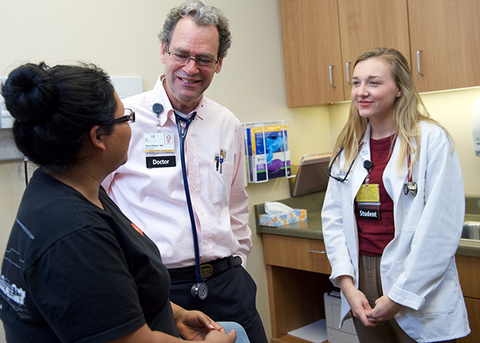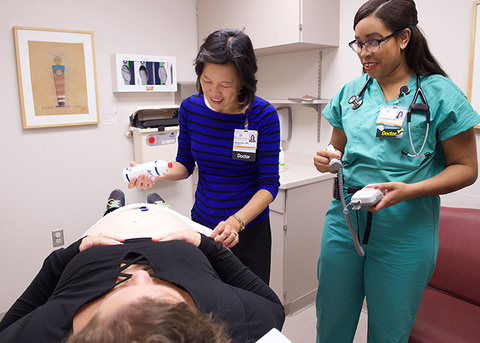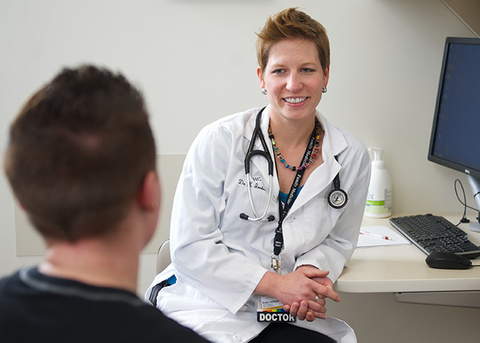Meet three University of Iowa Health Care physicians in the Department of Family Medicine who have found their niche and are helping populations that might otherwise find it difficult to get the care they need.

David Bedell, MD
Fluency in Spanish creates opportunities
Following his residency, David Bedell, MD, UI clinical associate professor of family medicine, was a volunteer physician for eight years in El Salvador with the nongovernmental organization Concern America. His medical duties included training community health workers, and he became fluent in Spanish.
“My work in El Salvador showed me the rewards of helping people with needs that are different from, or in some cases exceed, what we usually see in the United States,” Bedell says. “People who are underserved tend to be extremely appreciative. Language proficiency and cultural sensitivity can open a number of doors to extremely rewarding clinical opportunities.”
A faculty member since 1995, Bedell worked at the UI community clinic in Lone Tree until it moved to Riverside, where he is medical director. The River Crossing clinic sees many Spanish-speaking patients from across the region, including residents of West Liberty, Columbus Junction, and Washington. The clinic’s three physicians speak Spanish fluently. Bedell’s longtime association with the clinic and these rural communities means he has cared for generations of families.
“I’m now providing prenatal care and delivering babies for women that I delivered. It’s really flattering when a patient says, ‘I want to see Dr. Bedell because he delivered me,’” he says.
Bedell is a civil surgeon—he is designated to perform immigration physicals—and also medical director at Pioneer Park, a continuing care community in Lone Tree.
“I tell resident physicians, ‘If you practice family medicine and you don’t do OB, over time your patient population ages with you. But if you do OB, you bring new young people into your practice and you stay young as well,’” he says.
“During a pregnancy, you have a chance to get to know a patient and develop a relationship of mutual trust. Then you see them for the next couple of years frequently because of well-child visits. There’s a confidence that persists, even years later,” Bedell says. “If people are having difficulties with domestic violence, for example, they know there’s somebody they can trust to open up to. Or when you recommend a cancer screening or treatment for a chronic disease, that relationship makes them much more likely to listen.”

Wendy Shen, MD, PhD
Meeting demand for maternal care
Through a partnership with the UI Department of Family Medicine, a weekly maternal care clinic for uninsured women opened in November 2017 at the Iowa City Free Medical and Dental Clinic. The maternal care clinic’s launch came shortly after a change to Iowa Medicaid rules to limit maternity coverage. Most of the women served by the clinic are immigrants who have not yet been legal residents for five years, making them ineligible for standard Medicaid.
“We noticed that a number of our OB patients (in the UI Hospitals & Clinics Family Medicine Clinic) were not coming in for prenatal appointments, and then they showed up when there were complications or only when they were in labor,” says Wendy Shen, MD, PhD, clinical associate professor of family medicine, director of obstetrical services in family medicine, and medical director of the Family Medicine Clinic at UI Hospitals & Clinics.
“We know that regular prenatal visits improve the outcome of a pregnancy, both for mothers and their newborns. There is ample medical evidence that regular prenatal care is important for the health of our patients,” Shen says.
The Free Medical Clinic maternal care clinic averages eight or nine patient visits each week and served about 80 patients in its first year. Besides Shen, UI family medicine physicians David Bedell, MD, Jason Powers, MD, Alka Walter, MBBS, MS, and family medicine resident physicians staff the clinic, which welcomes medical student volunteers.
“We love having learners participate in this community service to learn what we, as family physicians, can do for our patients and for the community,” says Shen, a Free Medical Clinic provider for more than five years.
“The holistic aspect of family medicine really draws me in,” she says. “As family physicians, we care for our patients and their families throughout their lives. We not only take care of women during pregnancy, but also continue to support moms after birth and care for their children. This is high-quality, personalized health care.”
Serving individuals at the Free Medical Clinic in the community is not only helping to address a community health need, it provides a community benefit.

Katie Imborek, MD
Promoting inclusive care in LGBTQ Clinic
Providing quality care for patients who identify as lesbian, gay, bisexual, transgender, queer, or questioning is a priority for Katie Imborek, MD, clinical associate professor of family medicine and director of offsite primary care for UI Health Care.
Since 2012, she has co-directed the LGBTQ Clinic at UI Health Care–Iowa River Landing with Nicole Nisly, MD, professor of internal medicine. The clinic provides full-service health care, including chronic disease management, gynecological services, HIV testing and prevention, hormone therapy, and post-surgical care after gender-affirming surgery.
Nearly 80 percent of the clinic’s patients identify as transgender or gender-nonconforming. Historically, these patients have been marginalized or often denied care by other physicians.
“When we started the clinic, we were unsure of the number of transgender and gender-nonconforming patients living in Iowa and in need of health care, but as I’ve worked at the clinic and seen how many live in small-town Iowa, in all parts of Iowa, in places where our students are going to practice, I’ve been validated,” Imborek says.
Imborek first raised awareness of LGBTQ health issues as a UI medical student. She established the student organization MEDIQS (Med Iowa’s Queer Students), which has been renamed EQUAL Meds. Over the years, the student organization has hosted educational lectures, panels, and events to supplement the medical curriculum. Imborek is a faculty adviser to EQUAL Meds.
Establishing the LGBTQ Clinic has helped UI Health Care earn multiple years of recognition as an “LGBTQ Healthcare Equality Leader” from the Human Rights Campaign Foundation.
“The success of this clinic is in large part due to its multidisciplinary engagement and institutional commitment to diversity,” Imborek says. “We proudly have partnerships in OB-GYN, urology, plastic surgery, pediatric endocrinology, child psychiatry, and pharmacy to provide patients with the care they need.”